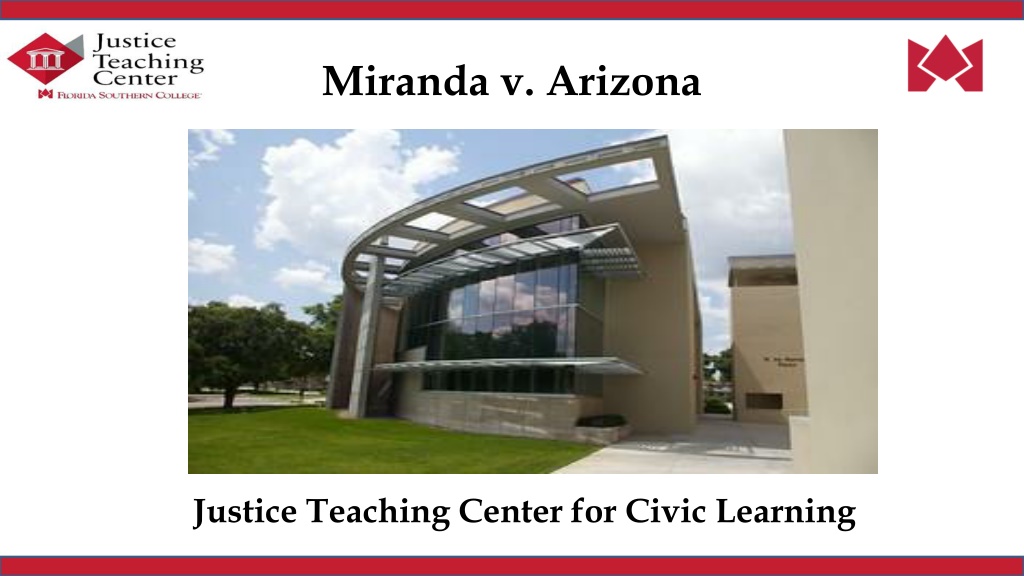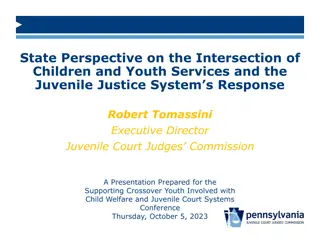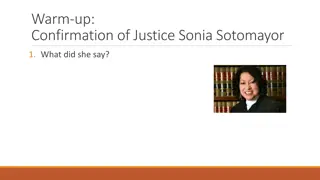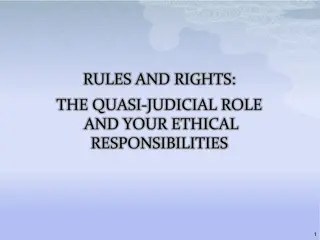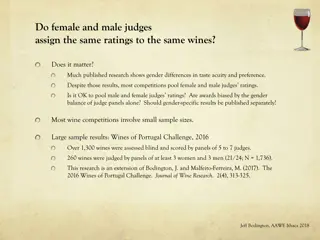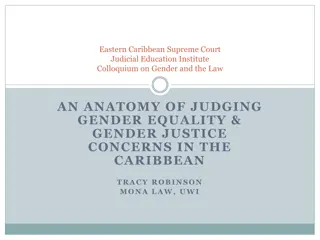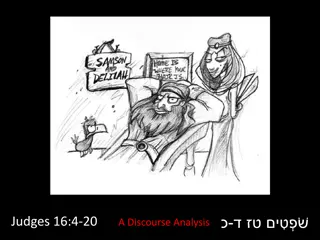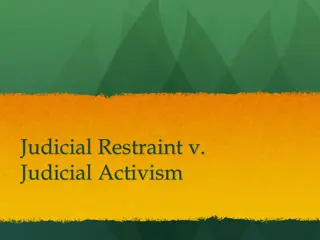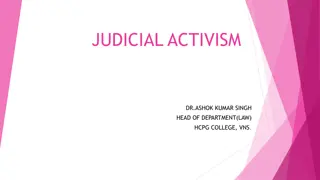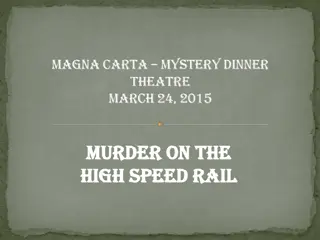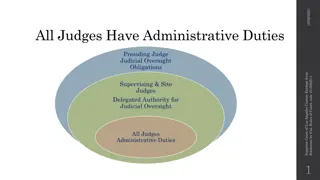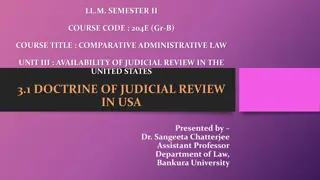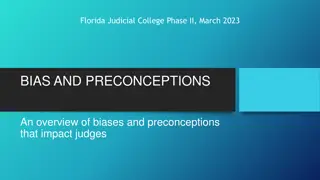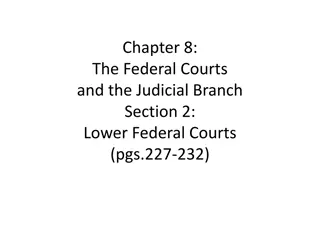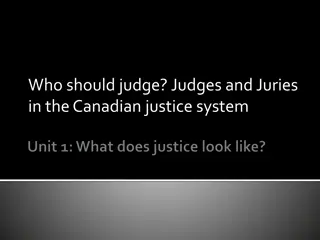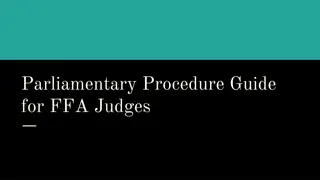Understanding Judges and Judicial Responsibilities
Explore the roles and responsibilities of judges, the differences between judges and other elected officials, the impact of political pressures on judicial decisions, the checks on judges to uphold the law, and a simulation where you act as a Justice on the Supreme Court deciding a case involving the Constitution.
Download Presentation

Please find below an Image/Link to download the presentation.
The content on the website is provided AS IS for your information and personal use only. It may not be sold, licensed, or shared on other websites without obtaining consent from the author. Download presentation by click this link. If you encounter any issues during the download, it is possible that the publisher has removed the file from their server.
E N D
Presentation Transcript
Miranda v. Arizona Justice Teaching Center for Civic Learning
If you were responsible for selecting all of the judges in Florida, what would you look for? Knowledge Skills Disposition Other qualities
How are judges different from other elected officials such as legislators?
Should judges be influenced by political pressures when deciding a case? Would you want a judge to make a decision based on the law or how the public might react to the decision? Should judges do what is legally right or should they do what is popular?
Checks on Judges Judges must follow: The Constitution Statutes (laws passed by the legislative branch) Rules Higher court decisions (precedent) *All decisions of the judicial branch may be reviewed by a higher court*
So, a judge cannot decide a case based on how he or she feels about an issue.
If a judge does not follow the existing law but decides a case based only on how he or she feels about the issue, the decision is subject to review by an appellate court. All courts are subject to review by a higher court except for the highest court in the country: the Supreme Court of the United States.
Today, you will be a justice on the United States Supreme Court and decide a real case involving the United States Constitution.
But first You need to know about the Fifth and Fourteenth Amendments to the United States Constitution.
The Fifth Amendment No person . . . shall be compelled in any criminal case to be a witness against himself; nor be deprived of life, liberty, or property, without due process of law . . . .
The Due Process Clause of the Fourteenth Amendment . . . Nor shall any state deprive any person of life, liberty, or property, without due process of law . . . .
Constitutional Questions 1. What does it mean to be compelled to be a witness against yourself?
Constitutional Questions What does it mean to be compelled to be a witness against yourself? Compelled : To cause an action by force or overwhelming pressure Witness : Someone that gives evidence, specifically, someone who testifies in a cause or before a judicial tribunal *Merriam Webster s Dictionary
Constitutional Questions 2. What does due process mean?
Constitutional Questions What does due process mean? The conduct of legal proceedings according to established rules and principles for the protection and enforcement of the rights of individuals. Both the Fifth and Fourteenth Amendments have a Due Process Clause. The Fourteenth Amendment specifically applies to actions of the states, rather than the federal government. *Black s Law Dictionary
Due Process & confessions: Brown v. Mississippi, 297 U.S. 278 (1936) Three African-American men were charged with the murder of a white man in Mississippi in 1934. The only evidence that the defendants murdered the victim were confessions that the police obtained from the defendants after they were tortured. Officers whipped two of the defendants with a belt buckle and told them that the beatings would continue until they confessed. After another defendant told the officers he was innocent, they hung him up by his neck from a tree, released him, and then whipped him until he confessed.
Due Process & confessions: Brown v. Mississippi, 297 U.S. 278 (1936) After a one-day trial, the defendants were convicted of murder on the basis of these confessions and they were sentenced to death. The defendants appealed to the Mississippi Supreme Court, which affirmed the convictions.
Due Process & confessions: Brown v. Mississippi, 297 U.S. 278 (1936) However, a unanimous United States Supreme Court reversed the convictions. The Court held: Confessions obtained by physical torture violate the Due Process Clause of the Fourteenth Amendment and cannot be used during trial. A confession can only be used during trial against the speaker if it was freely and voluntarily given. The rack and torture chamber may not be substituted for the witness stand. The state may not permit an accused to be hurried to conviction under mob domination where the whole proceeding is but a mask without supplying corrective process.
Due Process & confessions: Chambers v. Florida, 309 U.S. 227 (1940) After an elderly man was robbed and murdered in Pompano Beach, Florida, police arrested between 25 and 40 African American men. The suspects were held in the Broward County jail for a week, where they were questioned individually by groups of officers and prosecutors. At one point, some suspects were transported to Miami due to concerns about a local mob seeking vigilante justice.
Due Process & confessions: Chambers v. Florida, 309 U.S. 227 (1940) None of the suspects were allowed to speak to friends, family, or attorneys, nor was anyone formally charged with a crime. After one week of interrogation, which included questioning that lasted all night, four defendants confessed. The defendants were convicted based on these confessions and sentenced to death.
Due Process & confessions: Chambers v. Florida, 309 U.S. 227 (1940) The four defendants appealed, but the Florida Supreme Court concluded that the confessions were voluntary and affirmed the convictions and sentences. The United States Supreme Court unanimously reversed the convictions. The Supreme Court held that confessions obtained under duress from prolonged questioning, without access to lawyers or family, violated the Due Process Clause of the Fourteenth Amendment.
Due Process & confessions: Cicenia v. La Gay, 357 U.S. 504 (1958) Officers suspected Mr. Cicenia of a robbery and murder of a convenience store clerk. They could not find him at his house, but left him a message that asked him to come to the police station the next day. Cicenia spoke to a lawyer, who told him to report to the station. He arrived at 9 AM with his family, and officers spoke with him alone until 9:30 PM that night. During questioning, both Cicenia and his lawyer asked to speak to each other, but officers denied the requests. At 9:30 PM, Cicenia confessed to the murder.
Due Process & confessions: Cicenia v. La Gay, 357 U.S. 504 (1958) During trial, Cicenia asked the court not to admit his confession because he claimed it was coerced. The trial court denied the request. Cicenia was convicted for the murder and sentenced to life imprisonment with hard labor. The New Jersey Supreme Court held that the confession was properly admitted and affirmed his conviction. Cicenia appealed to the United States Supreme Court.
Due Process & confessions: Cicenia v. La Gay, 357 U.S. 504 (1958) The United States Supreme Court also upheld the conviction and determined that none of Cicenia s rights were violated. The Supreme Court expressed concern that requiring the state officers to honor Cicenia s requests for his attorney during questioning would undermine police investigations.
Todays Case MIRANDA V. ARIZONA, 384 U.S. 436 (1966)
The facts of Miranda v. Arizona* Ernesto Miranda, who had a long criminal history, was arrested for kidnapping and rape. After a line-up, police interrogated Miranda for two hours. He subsequently wrote and signed a confession. The confession included a statement that he was aware of his right against self- incrimination. But while he was in police custody, officers never told Miranda of his right against self-incrimination under the Fifth Amendment, or his right to an attorney under the Sixth Amendment. *Miranda v. Arizona actually involved four cases consolidated before the U.S. Supreme Court. We only consider the facts involving Mr. Miranda.
The facts of Miranda v. Arizona During trial, Miranda asked the court to exclude his confession. The court denied the request, and the jury heard the confession. Miranda was convicted for kidnapping and rape, and sentenced to 20 to 30 years for each conviction. He lost his appeal to the Arizona Supreme Court, which held that the confession was not unconstitutionally obtained. The appellate court noted that Miranda should have known his rights because he had been arrested many times before. He never asked to speak to an attorney during this police interrogation. Miranda now appeals his case to the United States Supreme Court.
Now you are a Justice on the U.S. Supreme Court. Here is the question before the Court
Can incriminating statements made by a person who is in police custody and subject to police questioning be used against that person during trial if that person is not told of his or her constitutional rights?
Incriminating Statements Individually answer the question Yes or No based on the facts of the case, the Constitution, and case precedent. Consider the facts of Brown v. Mississippi, Chambers v. Florida, and Cicenia v. La Gay. Ask yourself how the facts of those cases are similar to, or different from, the facts involving Miranda. Give 3 reasons for your answer in writing.
Incriminating Statements If you answer yes you are deciding for the State of Arizona If you answer no you are deciding for Miranda
Incriminating Statements Form groups of 5. Choose a Chief Justice, who maintains order. Poll the Justices. How did each one of you answer the question and why? Try to reach a unanimous decision. You have 10 minutes to discuss the constitutional question presented, then take a final poll.
Incriminating Statements After each Court decides: Bring the Chief Justices to the front of the room to report on the decision of each group. Tally the results and announce the final decision.
Can incriminating statements made by a person who is in police custody and subject to police questioning be used against that person during trial if that person is not told of his or her constitutional rights?
What did the real U.S. Supreme Court say and why?
Miranda v. Arizona, 384 U.S. 436 (1966) The United States Supreme Court ruled by a vote of 5 to 4 that the Fifth Amendment protection against self-incrimination extends beyond the courtroom and applies to all people in all settings in which their freedom of action is curtailed in any significant way. Thus, in situations that involve custodial interrogation by the police, the prosecutor can only use incriminating statements by the defendant where proper procedural safeguards were used to protect against compelled confessions.
Miranda v. Arizona, 384 U.S. 436 (1966) These proper procedural safeguards are today known as the Miranda warnings. They include: The right to remain silent. Advising the suspect that anything said or done may be used against him or her in court. The right to an attorney before speaking with the police, and to have an attorney present during questioning. The right to have an attorney appointed for you, if the suspect cannot afford one.
Miranda v. Arizona, 384 U.S. 436 (1966) Because Miranda was not aware of his rights under the Fifth and Sixth Amendments when he confessed, the confession was held to be inadmissible against him in court. Today, police officers must administer the Miranda rights/warning before placing a suspect in custody and interrogating. Miranda, along with a prior case Escobedo v. Illinois, 378 U.S. 478 (1964), overruled the holding of Cicenia v. La Gay.
Miranda v. Arizona, 384 U.S. 436 (1966) 4 Justices dissented from the majority opinion Justices Clark, Harlan, White, and Stewart. In the dissent most remembered by historians and lawyers, Justice Harlan expressed concern that the bright- line rule would hamper legitimate police investigations and would not actually prevent police abuse or coercive interrogations.
